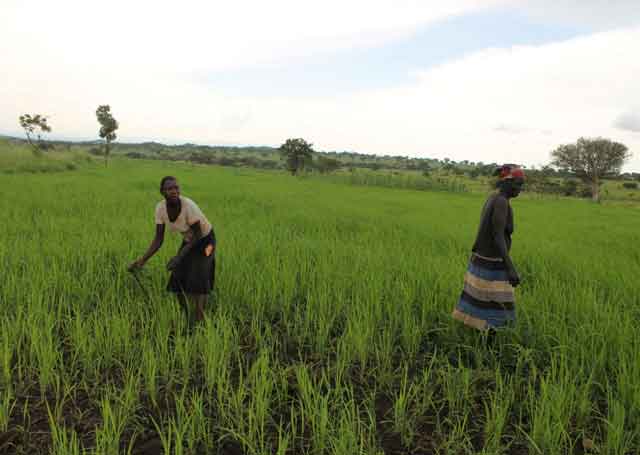
Kitgum, Uganda | THE INDEPENDENT | A sizeable percentage of locals in Acholi Sub-region whose livelihood were affected by the lockdown directives issued by the government to contain COVID-19 have embraced farming as an alternative for sustaining their livelihood.
The government issued lockdown restrictions in March, a move that saw the closure of several formal and informal non-essential institutions and businesses. Millions of people have since been rendered unemployed, forced to take unpaid leave or subjected to pay cuts.
Joel Odota, a resident of Padibe West Sub County in Lamwo district says that although farming runs in their family, he had not taken time to fully engage in agriculture until the pandemic rendered him jobless.
Odota, who worked as a Junior Associate with Challenges Worldwide Uganda in Kampala says he failed to secure his job when a ban on public transport was effected. At the time, he had travelled to Kitgum municipality to visit his family. Odota says he has now invested his savings into farming Okra on a one-acre piece of land in Tumangur village in Labongo Akwang Sub-county
Norman Zulu, another resident of Kitgum Municipality says that he was forced to embark on farming for the first time after realizing he had no source of income following the lockdown directives. Zulu says he planted pumpkin on a one-acre piece of land and intends to embark on commercial farming after realising the potential in farming pumpkin.
Paul Odong, a teacher in one of the privately-owned secondary schools in Pader District says life had become unbearable for him in the absence of a salary. Odong says he hasn’t been paid any salary for the past three months, a problem many teachers have faced since the closure of schools in March. He has now planted acreages of vegetables and cereals such as beans and maize.
Charles Ocaya, the Chairperson of the production, marketing and Natural resources committee in Kitgum District Local Government says reports indicate that land use has gone up greatly in the region during the lockdown.
Ocaya says improved land utilization for agriculture is bound to see an increase in food supplies and consequently improved income among households this season.
Madi-Opei Sub County Chairperson Charles Obong Okwera says that although the increased land utilization for agriculture is good for food production, markets for the goods produced are likely to remain scarce. He says supply will be in excess thereby resulting in a likely fall in prices of agricultural produce.
Meantime, increased agricultural engagement in the region has been a blessing to many agro-input dealers in the region.
For instance, Gertrude Oola, an input dealer at Shawa Agro-input Dealers and General Distribution in Kitgum Municipality boasts of making high sales during the lockdown period unlike in the past season. Oola says she was able to sell over 500 hand hoes between the month of March and April this year when the lockdown restrictions had just been instituted.
Ideal land utilization in the region has been disrupted in the past due to the two-decade Lord’s Resistance Army war led by elusive leader Joseph Kony that forced nearly 1 million people into displacement camps until around 2006.
*********
URN
 The Independent Uganda: You get the Truth we Pay the Price
The Independent Uganda: You get the Truth we Pay the Price





